| Article ID | Journal | Published Year | Pages | File Type |
|---|---|---|---|---|
| 936044 | Lingua | 2010 | 26 Pages |
This paper argues that the language sciences are on the brink of major changes in primary data, methods and theory. Reactions to ‘The myth of language universals’ (Evans and Levinson, 2009a and Evans and Levinson, 2009b) divide in response to these new challenges. Chomskyan-inspired ‘C-linguists’ defend a status quo, based on intuitive data and disparate universalizing abstract frameworks, reflecting 30 years of changing models. Linguists driven by interests in richer data and linguistic diversity, ‘D-linguists’, though more responsive to the new developments, have tended to lack an integrating framework. Here we outline such an integrative framework of the kind we were presupposing in ‘Myth’, namely a coevolutionary model of the interaction between mind and cultural linguistic traditions which puts variation central at all levels – a model that offers the right kind of response to the new challenges. In doing so we traverse the fundamental questions raised by the commentary in this special issue: What constitutes the data, what is the place of formal representations, how should linguistic comparison be done, what counts as explanation, what is the source of design in language?Radical changes in data, methods and theory are upon us. The future of the discipline will depend on responses to these changes: either the field turns in on itself and atrophies, or it modernizes, and tries to capitalize on the way language lies at the intersection of all the disciplines interested in human nature.
Research highlights▶ Coevolutionary accounts of the emergence of linguistic structure. ▶ Variability lies at the heart of language. ▶ Linguistics needs to change to accommodate massive changes in data, methods and theory. ▶ Explanation needs to be separated from formal representation. ▶ Models of the mind can be unburdened of ‘universal properties’ which are convergent properties of evolved systems.
